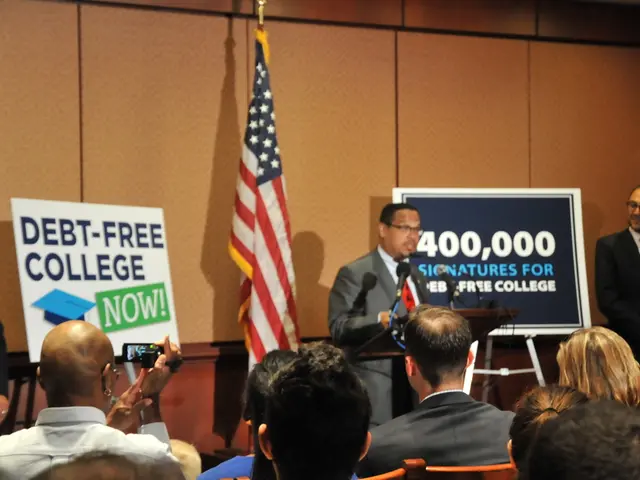SPD issues a warning to the Union about potential coalition collapse and AfD's mounting pressure
The political landscape in Germany is experiencing a period of uncertainty, as the Social Democratic Party (SPD) issues a warning to the Christian Democratic Union (CDU) and its Bavarian sister party, the Christian Social Union (CSU), against breaking the black-red coalition.
According to SPD Bundestag member Ralf Stegner, such a move could lead to the collapse of the current government majority, potentially triggering a government crisis or forcing early elections. This would be a significant blow to the prospects of Friedrich Merz, a leading candidate for the leadership of the CDU, who aims for the chancellorship presumably following the current government's term.
The black-red coalition has formed the basis of the federal government's parliamentary majority. If the Union were to withdraw from this coalition, the government could lose its majority in the Bundestag. This could weaken Merz's political standing by showcasing factional instability and undermining trust among potential coalition partners and voters, complicating his path to leading a stable government.
The political uncertainty resulting from a coalition breakdown could lead to difficulties in governance, bargaining challenges, and further polarization between the major parties. The SPD, despite having poor poll numbers, will not accept everything, as per Stegner. They cannot afford a repeat of the Hartz IV situation, a reference to a controversial welfare reform in Germany.
Stegner has compared this situation to the case of Brosius-Gersdorf, implying a previous instance of unacceptable actions or outcomes. He emphasized the need for energetic leadership from the party chairman, chancellor, and parliamentary group chairman, specifically mentioned as Friedrich Merz (CDU) and Jens Spahn (CDU).
The SPD politician predicts a challenging autumn for the coalition. If the leadership fails, the SPD may consider other options. However, it's important to note that there is no constitutional obligation to put the question of confidence in such cases.
The SPD's warning comes as the CDU/CSU and the far-right Alternative for Germany (AfD) could theoretically form a majority in the Bundestag if they were to join forces. This potential numerical advantage, referred to as the theoretical majority, could be used as a bargaining tool by a faction within the Union's parliamentary group. If the Union does not prevent this, according to Stegner, it could cost the joint government and also Merz the chancellorship.
While Ralf Stegner emphasized these risks as a warning reflecting the SPD's position, the political dynamics depend on subsequent negotiations, public opinion, and strategic decisions by both parties and their leaders. Stegner made these comments to "Die Welt" (Friday edition).
Read also:
- Weekly happenings in the German Federal Parliament (Bundestag)
- Southwest region's most popular posts, accompanied by an inquiry:
- Discussion between Putin and Trump in Alaska could potentially overshadow Ukraine's concerns
- Tinubu's administration allegedly causing issues within every political party as Peter Obi's name surfaces - Obidient Movement asserts








